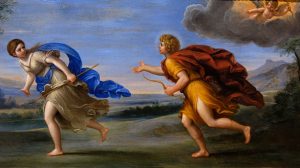Kate Farrell, Author, Librarian, Storyteller
Kate Farrell believes in the power of story. A graduate of the School of Library and Information Studies, UC Berkeley, she has been a language arts classroom teacher (pre-school and grades kindergarten through 12th), author, librarian, university lecturer, and storyteller in Northern California since 1966.
She founded the Word Weaving Storytelling Project, in collaboration with the California State Department of Education funded by grants from Zellerbach Family Fund, San Francisco, 1979-1991, to train educators at all levels, and published numerous educational materials:
Farrell is the author of Word Weaving: A Storytelling Workbook, 1980; co-author of a monograph, Effects of Storytelling: An Ancient Art for Modern Classrooms, 1982; author of Word Weaving: A Teaching Sourcebook, 1984; producer and co-author of a training videotape, “Word Weaving: The Art of Storytelling,” 1983, distributed by the University of California, Berkeley; and author of the professional book, Storytelling: A Guide for Teachers, Scholastic, 1991. She is also senior author of Storytelling in Our Multicultural World, an oral language development program for early childhood education, published by Zaner-Bloser, Educational Publishers of Highlights for Children, 1994.
Farrell edited the anthology, Wisdom Has a Voice: Every Daughter’s Memories of Mother, 2011. She is co-editor of the anthology, Times They Were A-Changing: Women Remember the ’60s & 70s, 2013—Finalist for Foreword Reviews 2014 Book of the Year Award and 2014 Indie Excellence Award. Farrell is co-editor for the anthology, Cry of the Nightbird: Writers Against Domestic Violence, 2014–Finalist for the 2015 Next Generation Indie Book Award and the 2015 Indie Excellence Award. Her recent book, Story Power: Secrets to Creating, Crafting, and Telling Memorable Stories was a Gold winner in the 2021 Next Generation Indie Book Award and Silver winner in the 2021 Readers’ Favorite Book Award.
She is a former board member of California Writers Club, Past President of the San Francisco Chapter of the Women’s National Book Association, and Youth Event Manager and Presenter for San Francisco Writers Conference. Kate lives in San Francisco and recently retired as a teacher librarian from San Francisco Unified School District.
The Power of Storytelling
San Francisco Junior High School, 1967

I stood behind the lectern, my place of refuge, and looked out at my ninth-grade students crammed into every desk in the bleak, overcrowded, urban classroom. It was the dreaded period right after lunch, on a hot, spring day, and I was to teach them English. I’d already discovered in this, my first year of teaching, that most of my students could not read or write at grade level, if at all.
My immediate solution had been, “Well, if they can’t read the literature, I’ll read it for them.” Over the months, I’d read aloud from the assigned, grade-level texts: Arabian Nights, Old Yeller, Great Expectations, and Greek mythology. Gripping the rickety, plywood lectern, I’d held sway over my classes with dramatic interpretations.
On that day, I’d prepared to read aloud a Greek myth. Irked at the tired, textbook prose, I realized I couldn’t stand to read another myth from that boring book. I stepped away from the lectern. I stood in front of the class. The class looked at me with some apprehension—I don’t think they’d seen my legs before. I began to tell them, in my own words, the tale that was next in the book, the story of Daphne and Apollo.
I will never forget the change in the room: Suddenly there was nothing else in it except my words and the students’ eyes, watching. They were looking at me with the greatest attention I’d ever received, but at the same time I knew they were not seeing me at all. They were seeing beyond me, into the myth. In fact, both the students and I were watching the adventure of Daphne and Apollo as it took place.
The classroom itself was transformed. It seemed to become the far-off Greek forest of long ago, with tangled green foliage and splashing streams. For the length of the story, we were there. It was electrifying! And I was no longer bored. No, I was never to forget that day’s experience.
